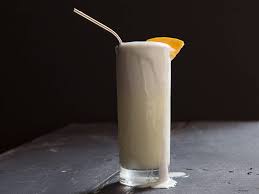Raw eggs and liquor have been combined in various cocktails and drinks throughout history, though this practice is less common today due to food safety concerns.
Some notable examples include:
- Eggnog: A traditional holiday drink made with milk, cream, sugar, and raw eggs, often mixed with spirits like rum, brandy, or whiskey.
- Flip: A category of cocktails that historically contained a whole raw egg, along with sugar and spirits. Modern versions may use only egg whites.
- Pisco Sour: A Peruvian cocktail made with pisco (grape brandy), lime juice, sugar, and egg white.
- Ramos Gin Fizz: A New Orleans cocktail containing gin, cream, lemon juice, lime juice, sugar, egg white, and orange flower water.
It's important to note that consuming raw eggs carries a risk of salmonella infection. Many modern bars use pasteurized egg products or alternatives to minimize this risk. Some people also believe that alcohol can "cook" the egg, but this is not scientifically accurate.
Here's the recipe for a Ramos Gin Fizz
Ingredients:
- 2 oz gin
- 1 oz heavy cream
- 1 egg white
- 0.5 oz fresh lemon juice
- 0.5 oz fresh lime juice
- 0.5 oz simple syrup
- 3 drops orange flower water
- 1 oz club soda
- Ice
Instructions:
- Add gin, heavy cream, egg white, lemon juice, lime juice, simple syrup, and orange flower water to a shaker without ice.
- Dry shake (without ice) vigorously for about 30 seconds to emulsify the egg white.
- Add ice to the shaker and shake again for another 30 seconds to chill.
- Strain into a chilled collins glass without ice.
- Top with club soda (about 1 oz).
- Optionally, garnish with a lemon twist.
Note: The traditional method calls for shaking for a very long time (sometimes up to 12 minutes) to achieve the signature foamy texture. Modern bartenders often use a shorter shake time or other techniques to achieve similar results.
Remember, this recipe contains raw egg white. If you're concerned about food safety, you can use pasteurized egg whites or egg white substitutes.


